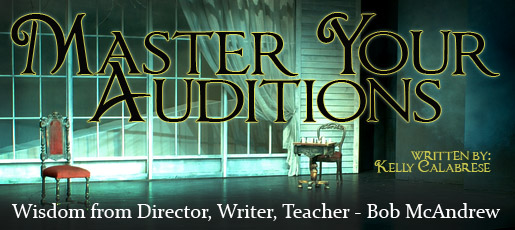As actors we have a relatively fun job. We get to dress up, play pretend, use our imaginations, and generally speaking, we get to hang out with fun, engaging, outgoing and artistic people. That’s the good part of the challenge.
Then there’s the part that most laypeople don’t see: we not only have to memorize daunting swaths of text, we have to deliver those words in a genuine manner is if we are saying them for the first time, then we must react to our scene partners’ lines as if we are hearing them for the first time, all while walking and talking either on a stage or in front of a camera as if we were not being looked at by an audience or a filmmaking team.
So actors can be forgiven if a few things slip under our radar and we succumb to some of these common clichés when on set or on stage. But in order to take your acting game to the next level, you should avoid these common mistakes, ones you might not always be aware of. Here’s how.
1. Super strength
Remember those massive Styrofoam boulders Captain Kirk would toss around on the original Star Trek? Don’t be that guy. It’s always kind of hilarious and yet cringe-worthy at the same time when you see an actor slinging around a huge suitcase or a big box as if it were empty–because it is. But as silly as it sounds, something so simple can really take your audience out of the moment and ruin the suspension of disbelief. The easy fix is to ask props to please put at least a few pairs of pants and some shirts in your suitcase–better yet, fill it up–or to load your “moving boxes” with a few non-noise-producing items that will give it at least a little weight. As actors we are of course subject to the decisions of the director, but we also have to take responsibility for our own scenes and characters. It’s not too much to politely request help from the rest of the crew to make the scene more believable, even if you’re the only person to think of this detail. If you’re in a scene where you’re complaining about having to move huge boxes and they have enough weight to them so they don’t appear to be Star Trek boulders, your scene will be that much more believable, and thus help with the believability of the piece as a whole.
2. Sipping air
This is a staple of cop shows: the hard-bitten detective growling about the difficulty of the case and how he hasn’t slept in 36 hours. Someone hands him a piping-hot, fresh cup of joe from the filthy precinct coffee maker, and he grimly takes a sip–of nothing. The cup clearly has no weight to it–and importantly, also no heat. You drink hot coffee in a different way than you drink cold water–or air, for that matter–even if you are a tough-guy cop. The fix for this is remarkably easy too: ask props to give you half a cup of coffee or hot tea, little enough so it won’t spill, but enough to give the beverage some substance. If they demur due to safety concerns on set, at least ask for warm water. Hopefully it will be warm enough to create a little steam too.
3. Ignoring what’s happening around you
In real life if a person were walking along a busy street or in a crowded corridor having an intimate conversation with a friend about how they just got the test results back and they have an STD, they probably wouldn’t speak at the top of their lungs, right? So why do actors continue to do this sort of thing in television and movies? “Oh, I’m pregnant and I don’t think my husband’s the father.” Who says that out loud in a crowded coffee shop? When you’re shooting a scene, don’t pretend the extras aren’t there. Don’t pretend you’re isolated in your conversation with your scene partner if you aren’t isolated on set or on stage. We behave differently depending on if we’re in public, or we’re in private, or we’re in our own environment, or we’re in a strange place. As actors it’s part of our job to convey the reality of these various imaginary environments and put ourselves in these moments and let them take us–and therefore the audience–to whatever behavior they induce in us. Along these lines, if something goes awry on stage or on camera, be open to react to it. If you hear a plate crash to the floor off-camera or backstage, so does the microphone or the audience. Use your improv skills and your awareness and being in the moment to react somehow–you know, like a real person would. It’s great to keep your focus and remain in character and all that, and of course it’s important to do so. But reality has to dictate how we portray the unreality of the scenes we’re in, or else we lose the audience. Think about Dustin Hoffman’s famous improv moment in Midnight Cowboy when he was shooting a scene crossing a busy New York street, and a cabbie pulled into the crosswalk, nearly hitting him. If Hoffman had just looked to the director to cut rather than reacting in the moment and in character–when he smacked the hood of the cab and shouted, “I’m walking here!”–we would have been deprived of one of the classic lines of cinema, all totally improvised due to an accidental occurrence on location.
4. Difficulty with not so difficult objects
Have you seen those terrible low-budget commercials where the actor has a horrible time trying to cover a dish of leftovers with plastic wrap, or scrub a dirty pot? Unfortunately, these silly takes on how difficult everyday tasks are sometimes bleed over into television and film, as well as stage shows. What is it about Christmas lights being tangled that makes everyone freak out and behave like angry monkeys loaded up on espresso? If a task really isn’t that difficult in real life, please don’t try to make it look that way. If you’re doing something on camera or on stage that is just “a piece of business,” that’s exactly what it’s going to look like: nonsense to keep your hands busy.
5. Aimless pacing
While of course directors must and will create certain pictures in order to better tell a story, there’s nothing more infuriatingly amateur-looking than having actors drift around from mark to mark for no good reason, Telenovela-style. If you’re moving just to move, it reads to the audience. If you’ve been given a bit of blocking that doesn’t make a lot of sense to you, find or create yourself a reason why you cross to that place at that moment. Or ask! Creating film, television and stage shows is a collaborative process. Your input is vital to keeping it real. If it feels false to you, it will read as false to the audience. Help your director create a better piece, and you will be a better actor because of it.







